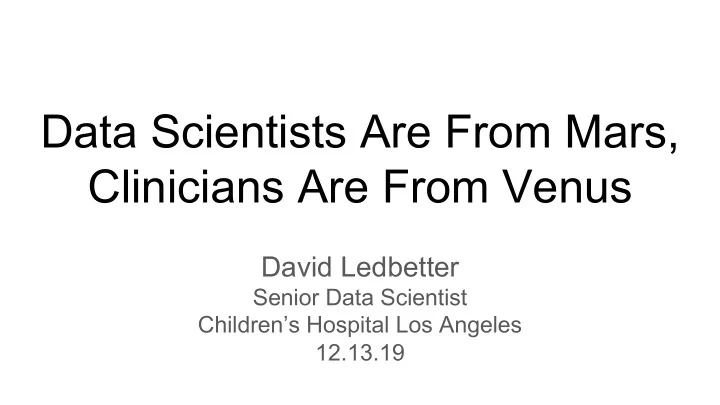

Data Scientists Are From Mars, Clinicians Are From Venus David Ledbetter Senior Data Scientist Children’s Hospital Los Angeles 12.13.19
Overview ● Introduction ● Data Science Training ● Clinical Outreach ● General Tips ● Conclusions
Overview ● Introduction ● Data Science Training ● Clinical Outreach ● General Tips ● Conclusions
Data Scientists ● Do these things right ○ Building data pipelines ○ Analyzing/Visualizing data ○ Training models to make specific predictions ○ Assessing out of sample performance ● But... ○ Don’t understand clinical context ○ Don’t understand when and how decisions are made ○ Struggle providing actionable intelligence (AI) ○ Don’t know which problems are clinically relevant
Clinical teams ● Understand the clinical setting ○ They’re the boots in the trenches ○ Know the problems ○ Know what information they need to make a decision ○ Understand the clinical workflow ● But some things not so good ○ Do most of their analysis in excel (STATA, SAS, etc.) ○ Most aren’t comfortable with big datasets ○ Most aren’t comfortable with more advanced modeling techniques ○ Frequently have a ‘statistical’ mindset rather than a ‘machine learning’ mindset ■ P-values and R-values vs. out of sample performance
Introduction ● Astronomical distance divides the Clinical and Data Science worlds ○ Biggest one: different languages spoken in each world ○ Different cost functions ■ Clinical workflow vs. error measures ■ Ease of use vs. technical novelty ● Both have knowledge and aptitudes that complement the other ● This talk: Things we’ve done at Children’s Hospital Los Angeles to help bridge these two worlds
Overview ● Introduction ● Data Science Training ● Clinical Outreach ● General Tips ● Conclusions
Data Science Training ● Expose new data scientists to the clinical world ○ Put them on rounds
Interdisciplinary team in ICU rounds Data Scientists Mother Anesthesiologist Respiratory Therapist Fellows RN RN Attending PNP Nutritionist Pharmacist Data Scientists
Data Science Training ● Expose new data scientists to the clinical world ○ Put them on rounds to see and gain perspectives on: ■ What it’s actually like in the unit ■ How data gets transferred between nurses, doctors, parents, patients ■ What data are clinicians looking at ■ What risk factors are clinicians looking out for ■ How to integrate into the clinical workflow
Data Science Training ● Expose new data scientists to the clinical world ○ Team them up 1:1 with clinicians ■ Learn how to talk about a problem with a clinician ■ Learn how meaningless MAEs and AUC scores are ■ Learn the importance of actionable and clinical workflow
Data Science Training ● Expose new data scientists to the clinical world ○ Build a common culture with the clinical teams ■ Go out to happy hour ■ Take the team out to karaoke ■ Get to see the humanity on either side ■ Data Scientists not just robots sitting behind computer screens
Clinician Outreach ● Expose clinicians to the data science world ○ Collaboration at every step of the process ■ Conception → I have this problem in the ICU ■ Design → What information at what time would help? ■ Munging → What do these values actually mean? ■ Assessment → Look at bad predictions together
General Tips ● Try to find low hanging fruit ○ Well-defined cohorts ○ Well-defined targets ○ Well-defined clinical decision points ○ Enough data that excel is cumbersome
Data Scientists Are Not Special There are 100s of data scientists who can map ! → ŷ with similar AUCs ● ● The real stratifying characteristic is communication ● Most data scientists [including me] are not natural communicators ● Communication skills: ○ can be practiced like any other ○ are necessary to execute data science projects in healthcare ● Without clinical exposure, DS can’t understand ○ What are the actual problems ○ When are decisions actually made ○ What information is available ○ What information is actionable
Conclusion ● Communication is the most important skill required for a successful DS/Clinical collaboration ● Need to focus on integrating DS and clinical teams at all levels ● Critical for DS to understand clinical workflows
Thank You dledbetter@chla.usc.edu
Recommend
More recommend